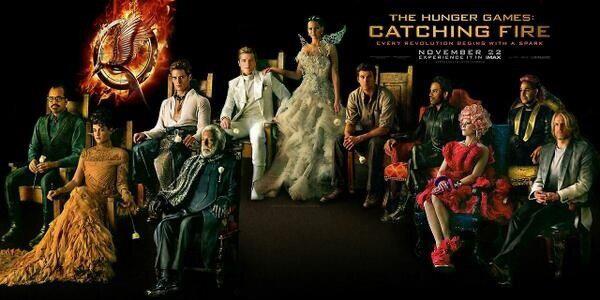*Any similarities to Ben’s life, real or imagined, are strictly coincidental.
It wasn’t until the next morning’s debrief that your good senses returned. His jokes didn’t land, the venue didn’t impress, and really, his suit and tie combo looked desperate, not debonair. You wouldn’t exactly say he botched it, but then again, you all knew he wouldn’t be getting another call.
As such, I approached The Hunger Games: Catching Fire more nervous than excited. Would the film succumb to the same bad habits? Would it begin with similar promise, only to devolve into predictable action scenes, late pacing problems, and lifeless supporting characters?
To my great relief, Catching Fire improves upon its predecessor in almost every way. It’s more clever, more conniving, and crucially, more confident. Gone are the cautious, nervous jitters of the first film; the clumsy plays for validation; the bad jokes and quiet insecurities. Catching Fire is pleased to play with viewers’ expectations, not desperate to win their approval. It’s like seeing your geeky friend again, all grown up.
That’s not to say the film plays out flawlessly. Half of Catching Fire’s action scenes run on computer-aided-autopilot, with our gorgeous heroes galloping through wisps of poison gas here or prides of flesh-eating monkeys there, all while observing the required beats of Hollywood suspense (a noble, unexpected sacrifice! a close call! a daring escape!). Look closely enough, and you can see a flustered Lionsgate exec demanding yet another formulaic action scene, his red face dully reflected in the sheen of on-screen axes, knives, and arrow heads.
Thankfully, the characters wielding said weapons are nearly all a delight. Finnick Odair (Sam Claflin, charming, mysterious, kooky) displays between ten and twenty times the character of any tribute in the first film, always milking his goofy smile, and just about never sitting still. He's at once off-putting and entirely likable: he evens steals a few scenes from the great Jennifer Lawrence. Then there’s Johanna Mason (Jena Malone, sharp, dark, appealing), who mixes sly scheming with brash rebelliousness. The two new characters’ respective introductions might just be the two best scenes in the film. Compared to the boring, brutish teens in the first movie, the improvement here cannot be overstated.
I could go on about Ms. Lawrence herself, of course, who brings a rare, electric energy to every scene in the movie. In the end, however, it’s not her charisma, beauty, or snappy dialogue that truly make the performance, but instead her defiant sense of humanity. Even as Katniss escapes death, outsmarts opponents, and inspires thousands of rebels, she remains stubbornly, vulnerably human. It’s a risky choice for a special effects blockbuster, but it keeps Catching Fire from selling its soul.
If there’s one character to rap on the wrist, it's Peeta (Josh Hutcherson, one-note), who’s all but accepted his fate as the series’ Ron Weasley. His two emotional modes—fear and forlorn affection—seem to be converging to form a single, constant facial expression. Rupert Grint (Ron, Harry Potter) would be proud. I don’t know whether to blame Hutcherson or series author Suzanne Collins, but regardless, it’s a solid win for Team Gale (Liam Hemsworth, vaguely handsome), who’s now poised to win the Katniss love triangle by default.
Outside the performances, Catching Fire also succeeds, if subtly, at making audiences appropriately uncomfortable. We respond in hushed surprise at a celebrity pregnancy, only to discover we’ve just become the brainless, entertainment-obsessed citizens of The Capitol. We eavesdrop on the dark strategies of the new Gamesmaker (Phillip Seymour Hoffman, chilling), then shiver at how close it comes to modern day reality TV. Granted, there’s nothing terribly deep here beyond the overall message—that our blind desire for cheap entertainment often comes at the expense of other people—but it’s a message that’s delivered delicately, persistently, and unapologetically.
Whether The Hunger Games film series comes to be known as a classic cinematic social commentary remains to be seen. After all, we still have o̶n̶e̶ two films to go. Admittedly, the odds are a bit long: the Hunger Games remains a silly, peculiar, unsteady series with ambitions likely too big for its pedigree. But who knows? After two dates, I’m beginning to feel my first impressions were wrong.


 RSS Feed
RSS Feed
